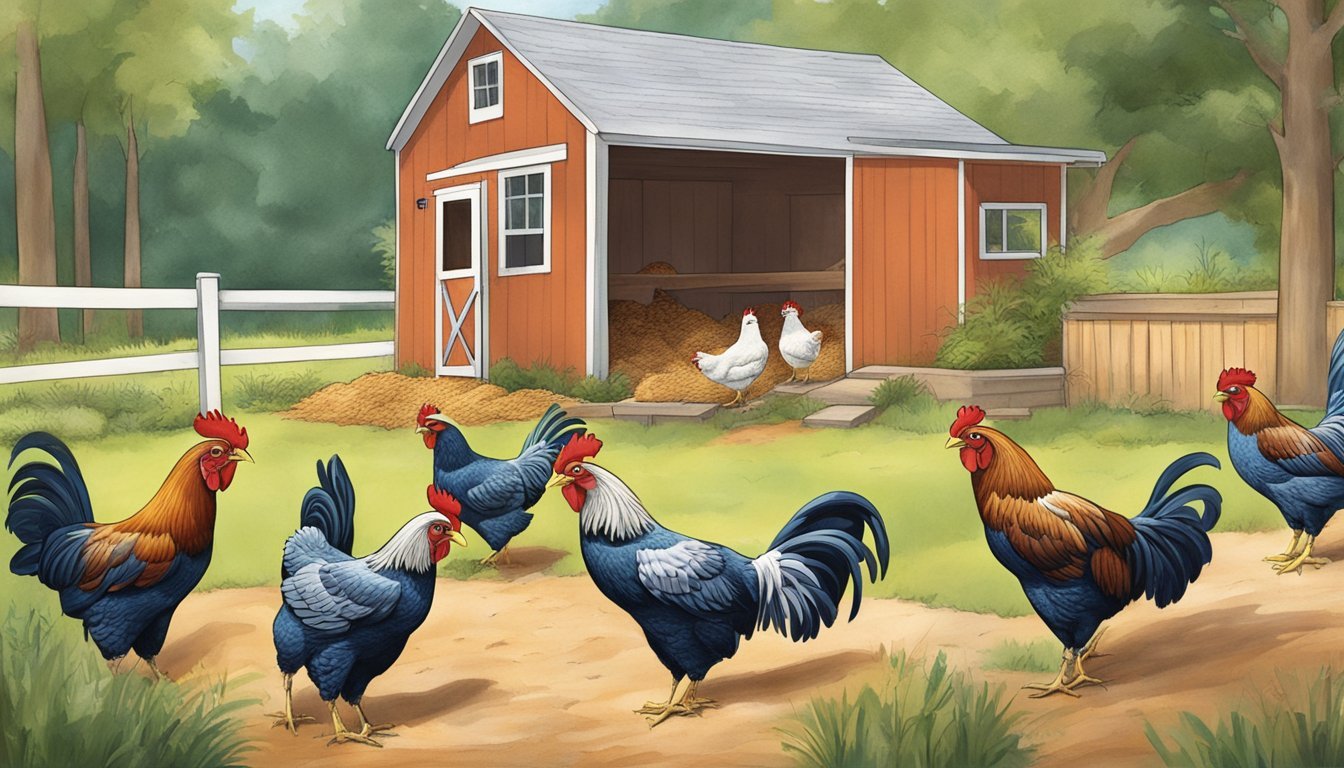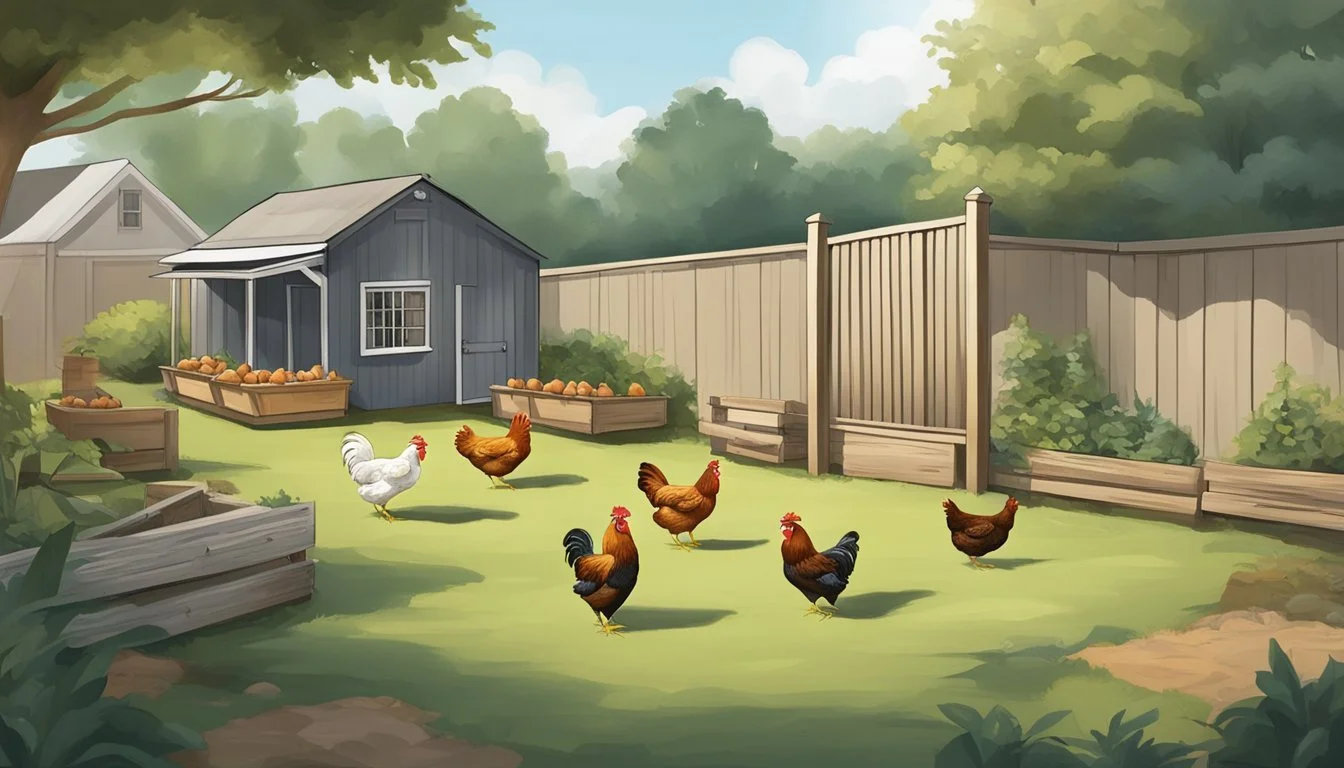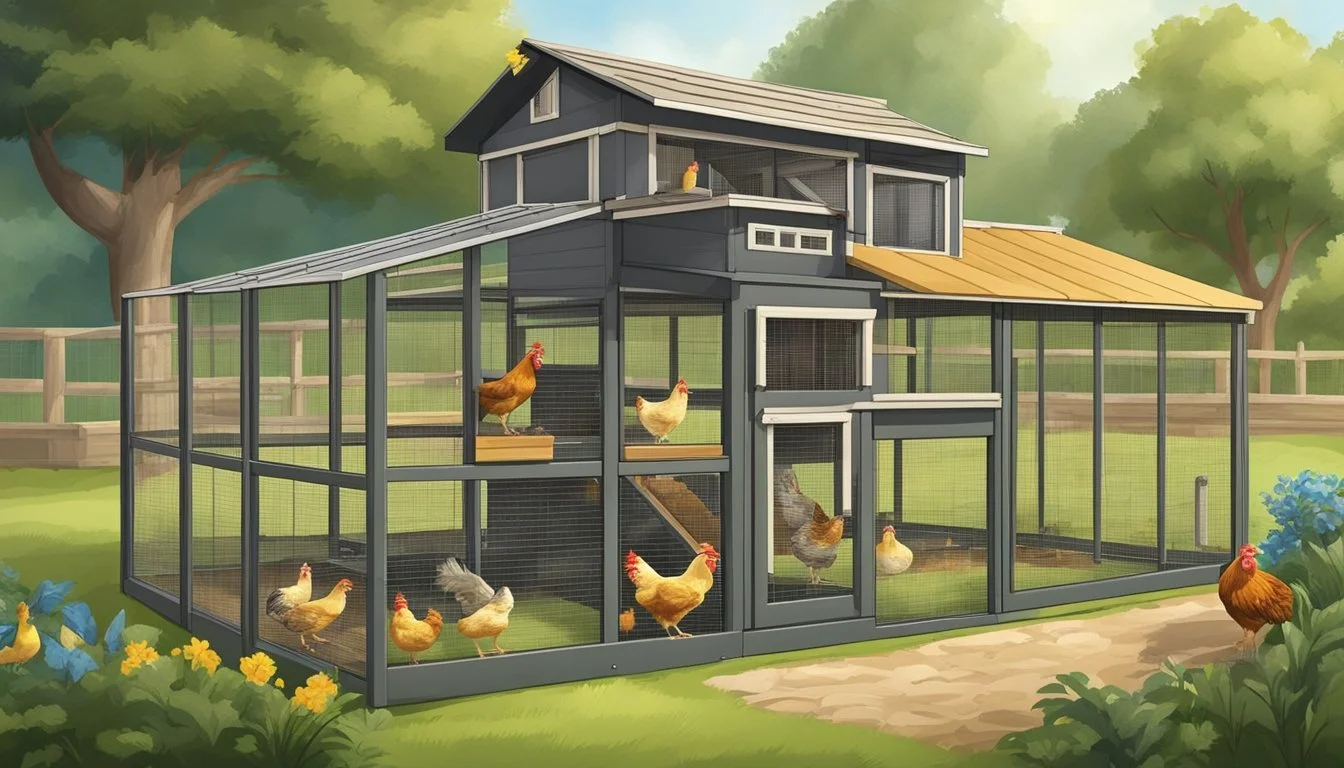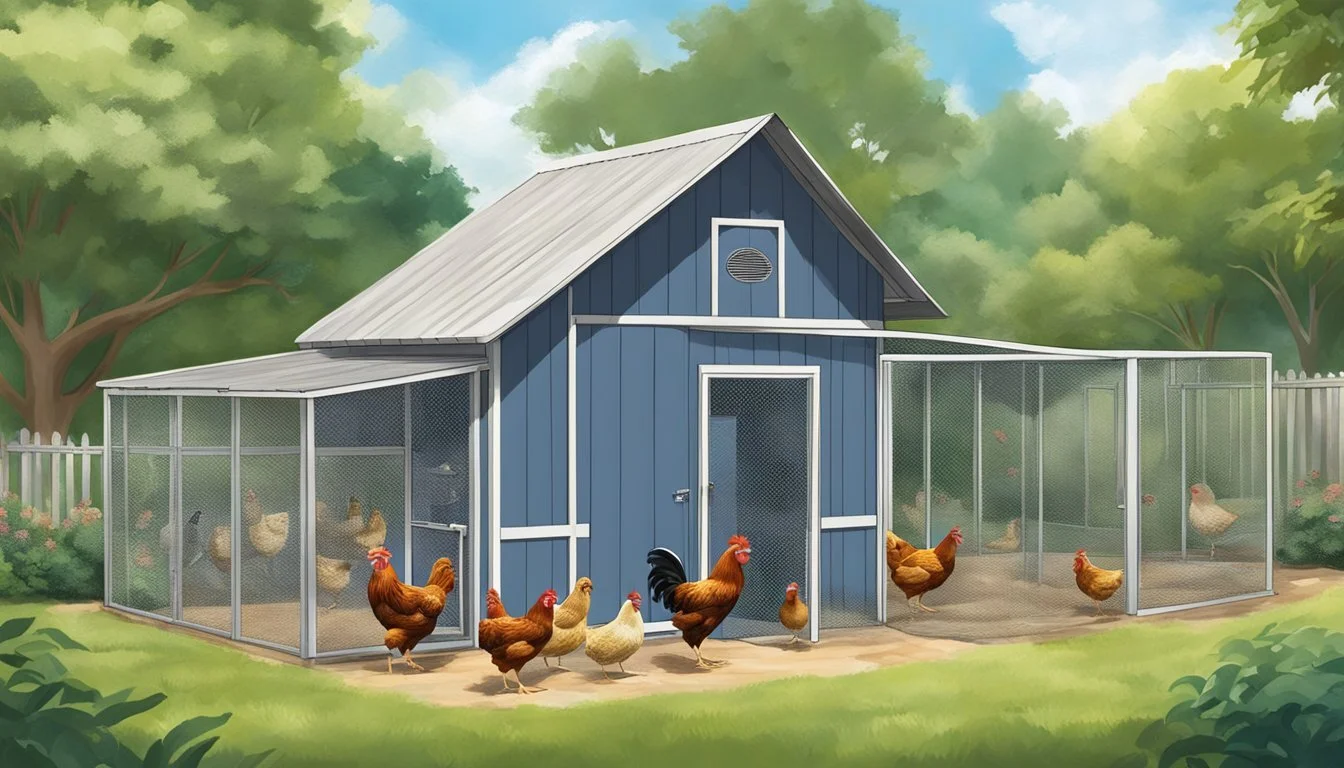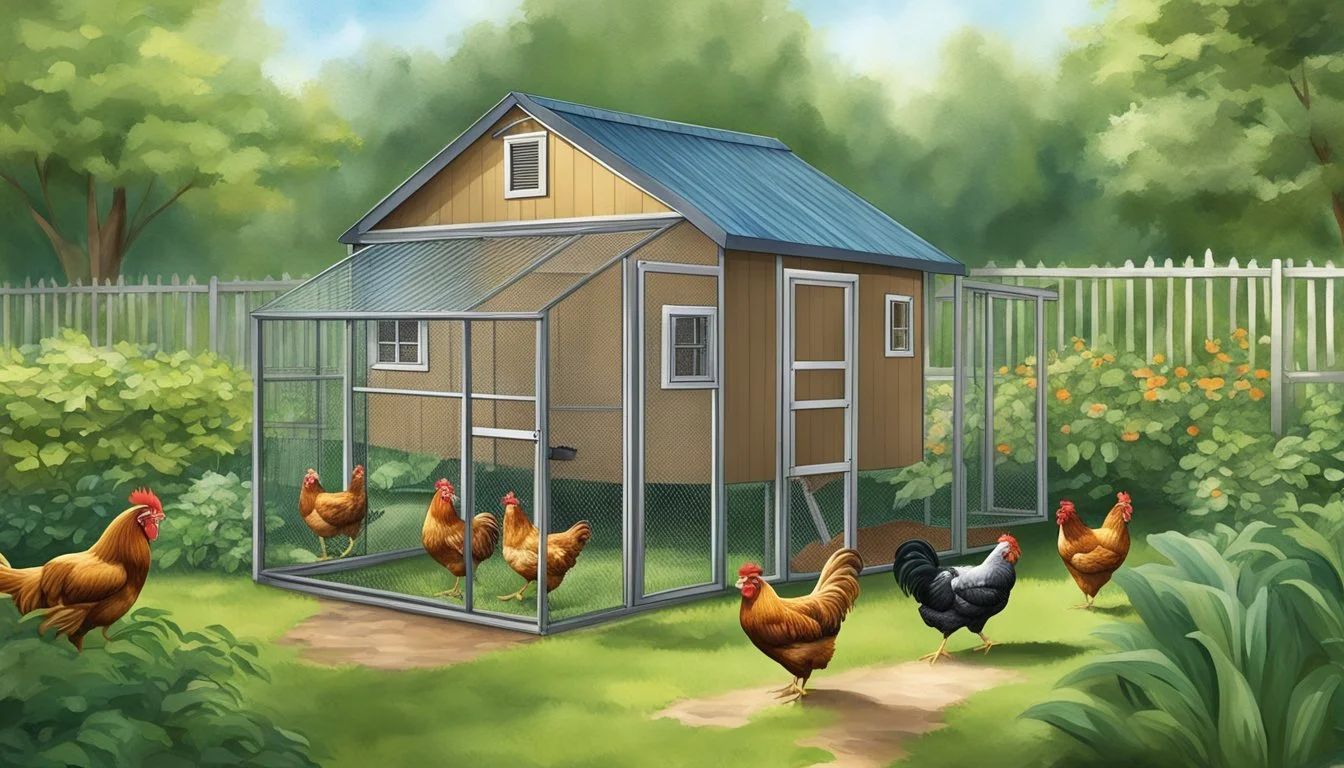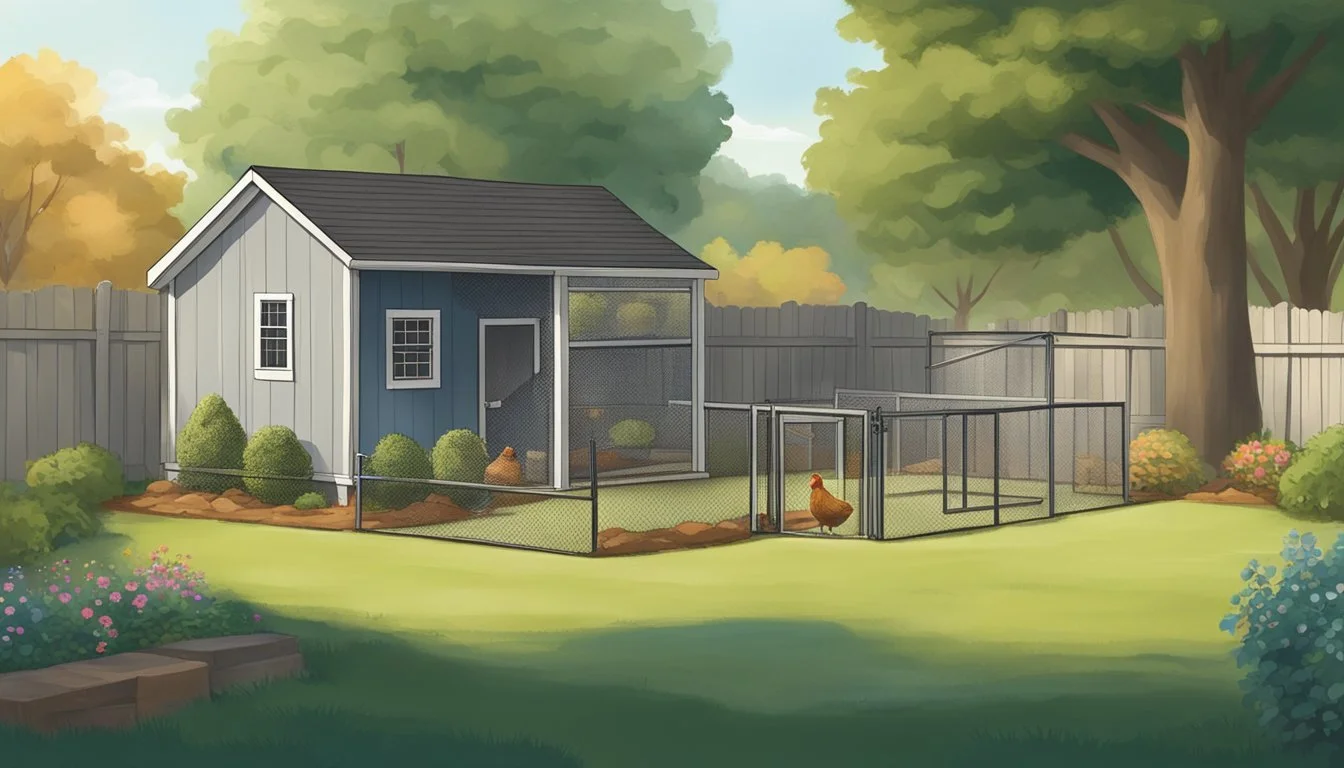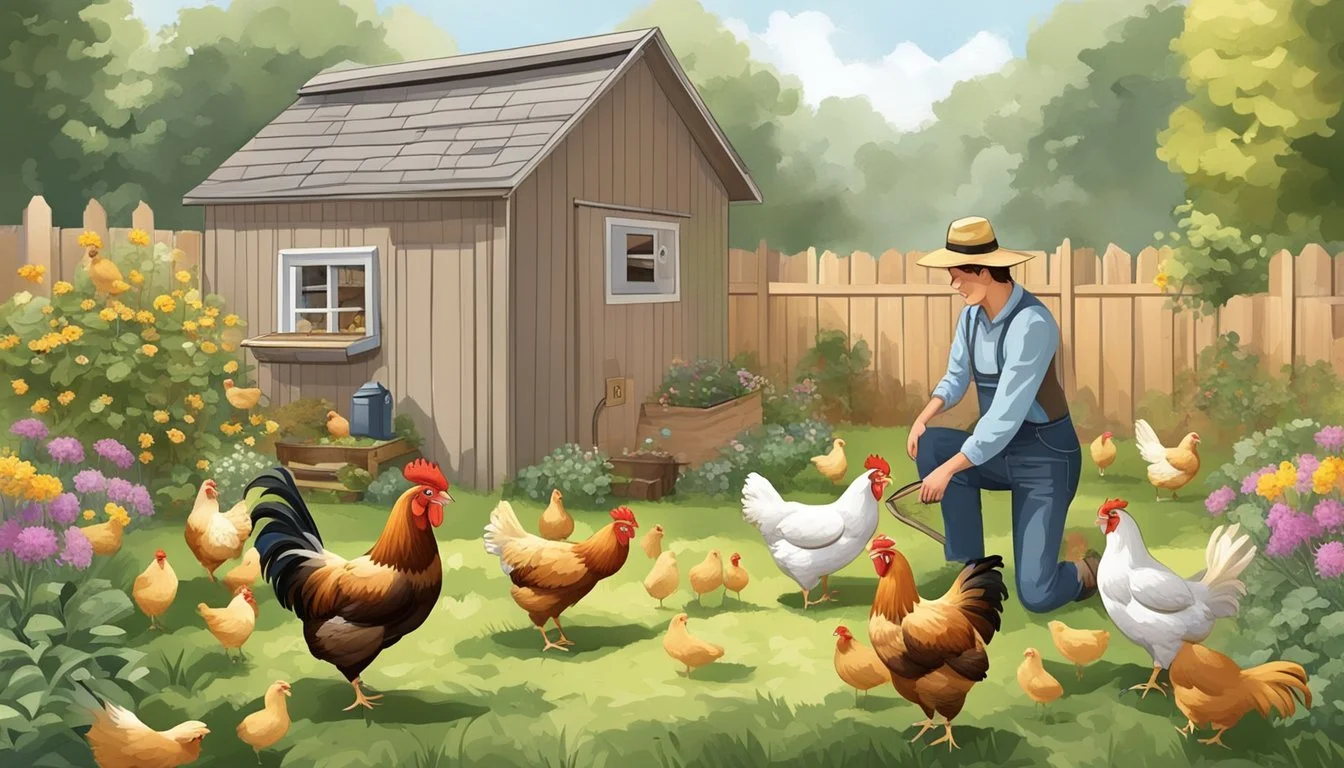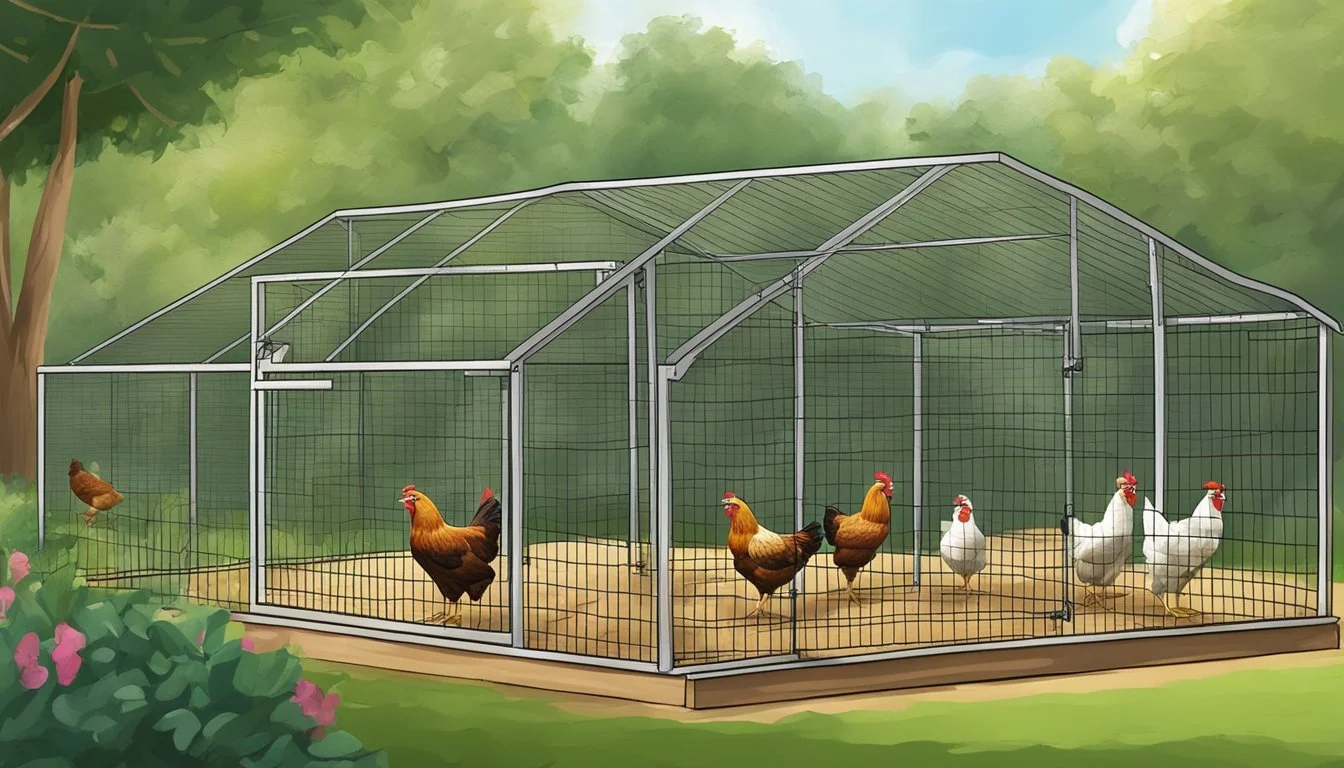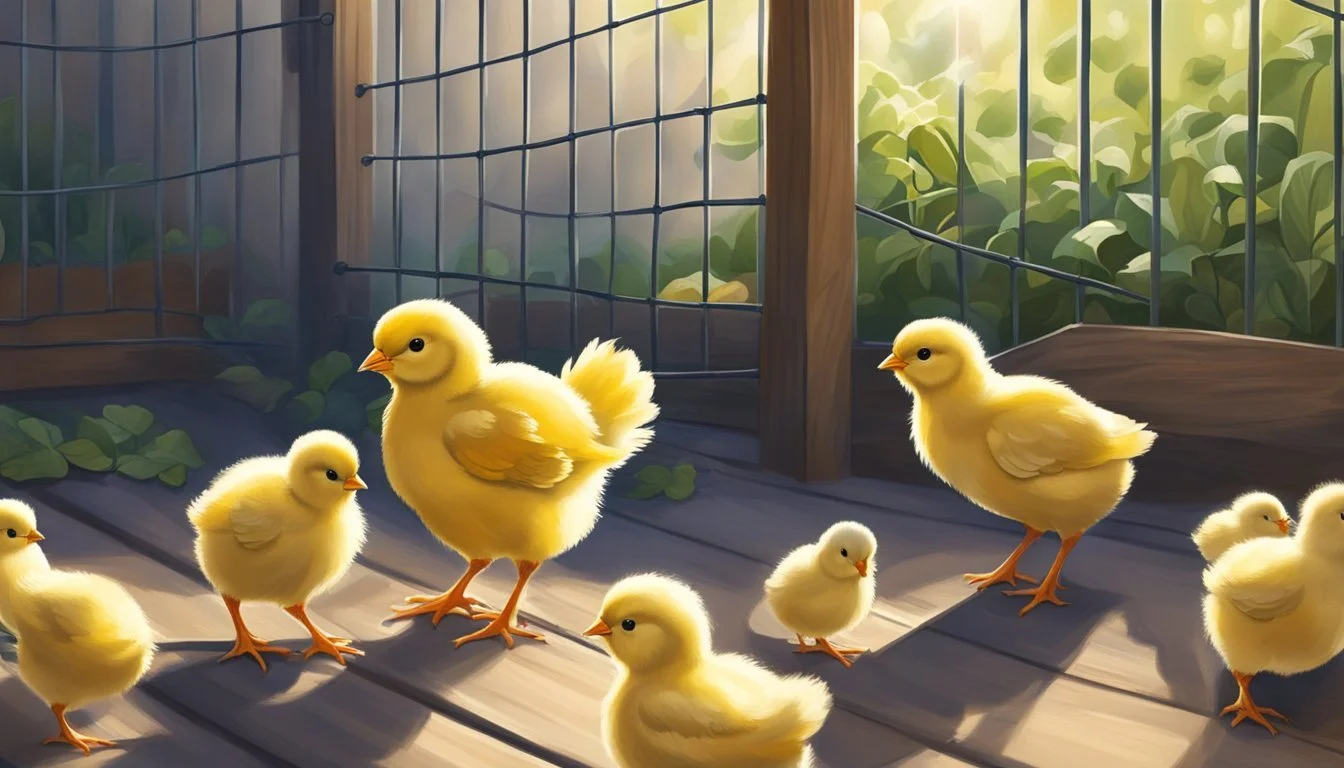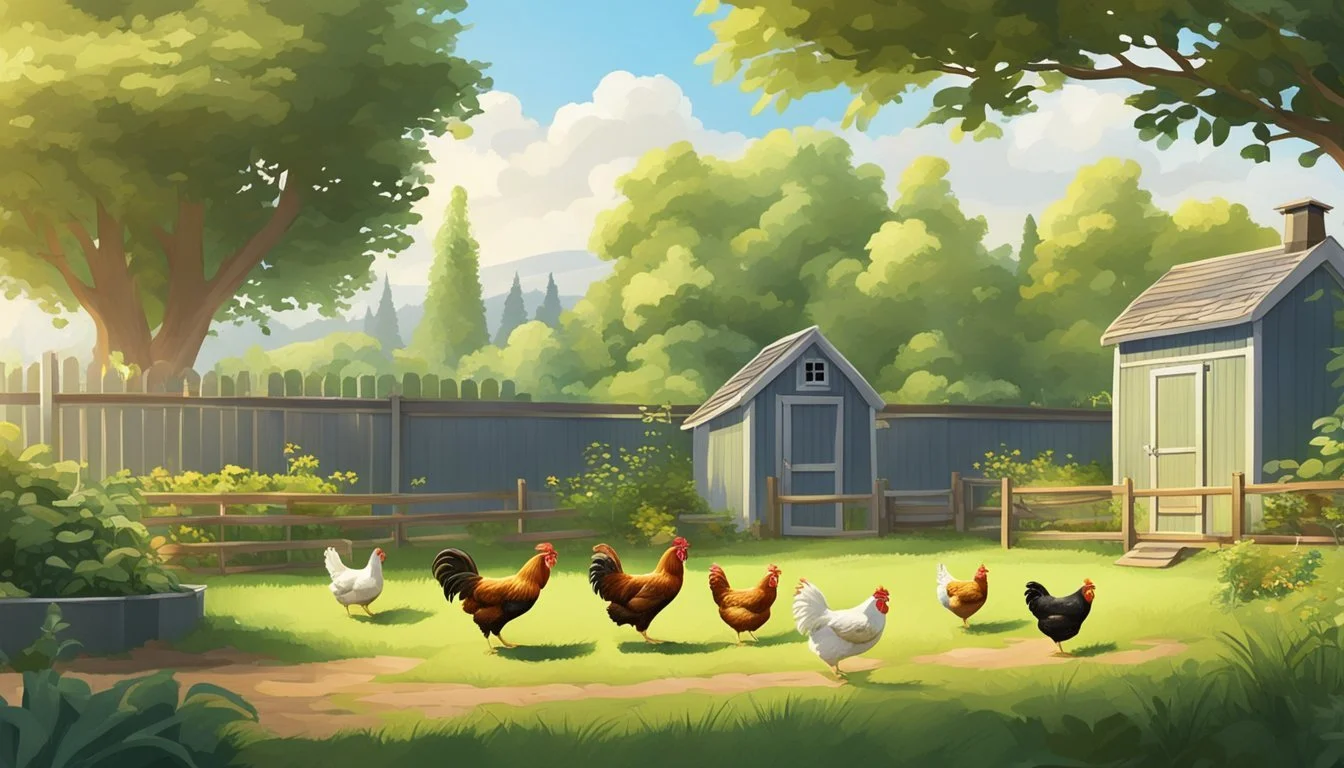Raising Backyard Chickens in Warner Robins, GA
A Primer for Urban Poultry Farming
Raising backyard chickens has become a popular practice for many homeowners seeking fresh eggs, natural pest control, and the simple pleasures of animal husbandry. In Warner Robins, Georgia, a town steeped in the heritage of the American South, the interest in this pastime reflects a growing movement towards sustainable living and local food production. However, residents looking to join this movement face specific regulations that restrict the raising of chickens within the city limits.
Prospective poultry enthusiasts in Warner Robins should be aware that current city ordinances prohibit the keeping of chickens in residential areas. This is outlined in the city's specific ban on owning, raising, or keeping fowl within properties that a person owns or controls within the metropolitan boundaries. Despite previous petitions and discussions among community members in favor of allowing backyard chickens, the rules remain firm.
Additionally, while the attitude toward backyard chickens might be more lenient in the state of Georgia as a whole, with various regions permitting the practice under certain conditions, Warner Robins maintains a stricter stance. This highlights the importance of familiarizing oneself with local laws before acquiring any chickens. It also underscores the necessity for those interested in changing these regulations to engage with local authorities and community planning bodies actively.
Understanding Local Chicken Ordinances
In Warner Robins, GA, individuals looking to raise backyard chickens must navigate specific city ordinances designed to regulate the practice.
Relevant Warner Robins Chicken Laws
Warner Robins' regulations on keeping backyard chickens are specific. Section 5-8 of the city's ordinances states that it is unlawful to raise or keep any fowl within the city unless permitted by city ordinances. This includes the prohibition of raising, keeping, or selling livestock or wild non-domestic animals on one's property.
Last updated: Ordinance No. 16-23, enacted May 15, 2023.
City Council and Chicken Ordinance Updates
It’s important for residents to stay informed on city council actions as ordinances may change. The city attorney plays a crucial role in drafting updates which are then approved by the council. To find the latest updates, residents can refer to the Municode Library, specifically Supplement 66, to ensure they are in compliance with current regulations.
Residential Zoning and Livestock Regulations
Residential areas in Warner Robins are subject to zoning laws that influence the keeping of backyard chickens. While Georgia chicken ordinances generally allow backyard chickens, local zoning regulations take precedence and may have specific limitations. Residents must check with local authorities to determine whether their residential zone permits the keeping of chickens and, if so, how many are allowed per lot.
It is additionally notable that Warner Robins' regulations discourage backyard chicken activities in densely populated subdivisions and typical city areas, ensuring that such practices are more suited to less dense, perhaps more rural parts of the city.
Choosing the Right Chicken Breed
Raising chickens in Warner Robins, Georgia, it's essential to consider both climate suitability and the temperament of the chicken breeds. Finding a breed that thrives in the local environment and fits with your needs will ensure a rewarding experience.
Considering Climate and Temperament
Warner Robins experiences hot summers and mild winters, which means chicken breeds that are adaptable to heat and have a fairly resilient nature are ideal. Avoid breeds prone to frostbite or that struggle with high temperatures.
Climate Suitability:
Hot Weather: Australorps and Sussex chickens are known for their ability to handle various climate conditions, including the warmer temperatures of Georgia.
Mild Winters: Both Rhodes Island Reds and Silkies can tolerate cooler weather, though Silkies are less heat-tolerant and might need some shade during the hottest months.
Temperament:
Australorps: Calm and friendly, they are good layers and suitable for families.
Sussex: Docile and adaptable, they can produce eggs well into the winter.
Rhode Island Reds: Independent but can be more aggressive, excellent for consistent egg laying.
Silkies: Known for their distinctive fluffy feathers, they are gentle and good with children.
Popular Breeds in Georgia
When choosing between popular chicken breeds in Warner Robins, consider the following:
Australorps: Prolific layers often producing 250-300 eggs per year.
Rhode Island Reds: Reliable layers of brown eggs.
Physical Characteristics:
Sussex: Come in several colors and have a heavy build, suitable for meat and eggs.
Silkies: Recognizable for their unique plumage, Silkies are more ornamental and less prolific in terms of egg production.
Adaptability:
All these breeds generally adapt well to backyard settings in Warner Robins, with Australorps and Rhode Island Reds being particularly hardy. It's critical to provide adequate shade and water to ensure their comfort during the hot summer months.
Basic Needs of Backyard Chickens
Raising backyard chickens in Warner Robins, Georgia requires understanding their basic needs. These include proper feeding, shelter, and attention to health and wellness. Providing for these ensures a thriving and productive flock.
Feeding
Chickens require a balanced diet to maintain their health and egg production. Initially, chicks should be fed a high-protein starter feed that contains 18-20% protein for the first 8 weeks. As they grow, transitioning to a starter/grower feed with 16-18% protein until they reach 14 weeks is necessary. Upon reaching laying maturity, hens benefit from a 16% finisher or layer feed to support egg production. Always ensure there is a constant supply of clean, fresh water.
0-8 weeks:
Starter feed crumbles (18-20% protein)
8-14 weeks:
Starter/grower feed (16-18% protein)
15-18 weeks and beyond:
Finisher or layer feed (16% protein)
Shelter
The chickens' shelter, commonly referred to as a coop, must be secure and spacious to accommodate the birds comfortably. Each chicken requires approximately four square feet of indoor space and ample outdoor space. Inside the coop, providing nesting boxes for egg layers is essential for egg production. Coops should be well-ventilated, kept clean, and include perches for roosting. A regular cleaning schedule helps maintain a healthy environment.
Indoor space: Minimum of 4 square feet per chicken
Outdoor space: Sufficient for exercise and foraging
Nesting boxes: One per 4-5 hens
Roosting perches
Cleanliness: Regular cleaning to prevent diseases
Health and Wellness
Health and wellness are heavily impacted by nutrition and living conditions. Chickens must be monitored for signs of illness, and preventive measures such as vaccinations should be in place. A stress-free environment contributes to the flock's overall wellness. Pests and parasites must be controlled, and any signs of distress or disease require immediate attention. Regular veterinary check-ups can help maintain health.
Health checklist:
Monitor for abnormal behavior or signs of illness
Keep vaccinations up to date
Control pests and parasites
Conduct regular veterinary check-ups
Designing a Chicken Coop
When designing a chicken coop in Warner Robins, Georgia, consideration must be given to the coop's size and placement, the inclusion of appropriate security features, and the management of internal temperatures to ensure the wellbeing of the chickens.
Coop Size and Placement
The size of the coop should afford each chicken at least 3-4 square feet of space. Optimally, in Warner Robins where local ordinances must be respected, a homeowner should design the coop to align with zoning requirements, which might limit the number of chickens allowed.
Example Sizes:
For 5 chickens: at least 15-20 square feet.
For 10 chickens: at least 30-40 square feet.
Concerning placement, coops should be situated in a well-drained area to avoid accumulation of moisture. It is also important to ensure the coop is positioned to receive ample sunlight, which helps maintain a dry and sanitary environment.
Security Features
Chickens need protection from predators. This necessitates sturdy construction materials and secured entry points. A coop must have:
Fencing: A fence buried at least 12 inches underground.
Locks: Heavy-duty locks on doors and windows.
Wire Mesh: Small mesh sizes to prevent predators from reaching in.
Strong hinges and latches that are tamper-proof to deterring wildlife or domestic animals.
Temperature Control
Proper temperature control is essential for the health of backyard chickens. One should:
Install a thermometer to monitor the inside temperature of the coop.
Implement ventilation to combat overheating in the summer months.
Provide coop heating such as a heat lamp or panel heater for colder nights, ensuring that it is safely installed to prevent fire hazards.
Remember, direct ventilation away from roosting areas to avoid drafts. For optimal coop lighting, windows can provide natural light which helps regulate the chickens' laying cycles, with added lighting being a consideration for shorter days in winter.
In summary, when constructing a backyard chicken coop, prioritize the space needs of the chickens, ensure their safety from potential threats, and manage the internal climate to foster a healthy environment.
Protecting Your Flock from Predators
Ensuring the safety of backyard chickens in Warner Robins, GA involves understanding local predator behaviors and implementing effective structural defenses.
Common Predators in Warner Robins
In Warner Robins, chicken owners should be vigilant against a variety of local predators that pose threats to poultry. These include:
Mammals: Raccoons, opossums, foxes, and stray dogs are known for their cleverness and determination to access chicken coops.
Birds of Prey: Owls and hawks hunt during day and night, targeting free-ranging chickens.
Reptiles: Snakes can be a nuisance, mainly threatening eggs and smaller fowl.
Rodents: Rats and mice, though less of a threat to adult birds, should not be overlooked as they can damage supplies and infrastructure.
Confounding these predators involves a combination of vigilance and preventive measures.
Structural Defenses and Strategies
An effective strategy for protecting chickens includes a comprehensive approach to coop and run security:
Coop Construction:
Use 1/2 inch hardware cloth for windows, vents, and any openings to provide robust barriers against intruders.
Ensure coops are well-ventilated yet secure; all access doors and panels must be fitted with high-quality locks.
Examine regularly for any signs of attempted entry or wear that could be exploited by predators.
Run Fortification:
Enclose runs with fencing that is buried a foot or more underground to deter digging predators.
Overhead netting can help protect against birds of prey.
Consider the use of electric fencing as an additional deterrent, ensuring to follow local guidelines and safety precautions.
Routine and Vigilance:
Establish a routine to lock up fowl at dusk and release them in the morning.
Use automatic coop doors to maintain security, especially when away from home or arriving back late.
Regularly inspect the perimeter for signs of predator activity and reinforce any weak points immediately.
Through these measures, chicken owners in Warner Robins can create a secure environment that affords their flock protection against common predators.
Daily Management and Maintenance
Effective daily management and maintenance are crucial for the health and well-being of backyard chickens in Warner Robins, GA. They require consistent care, which includes routine cleaning, proper feeding, and egg collection.
Cleaning and Upkeep
Daily cleaning tasks are vital to prevent the buildup of waste and to control odors in the coop. Homeowners should remove droppings and replace dirty bedding to maintain a clean environment. Utilizing coop deodorizers can help reduce smells, while waste materials can be composted to create nutrient-rich soil for gardens.
Daily Tasks:
Remove droppings from the coop floor and nesting areas.
Check for and clear any spilled feed or water to prevent mold and pests.
Weekly Tasks:
Replace soiled bedding with fresh material.
Perform a more thorough cleaning of the entire coop.
Monthly Tasks:
Disinfect feeders and waterers.
Apply coop deodorizers to control odors effectively.
Feeding Routines
Chickens need consistent access to fresh feed and water. High-quality chicken feed should be provided through chicken feeders to avoid contamination and waste. Waterers should be refilled daily with clean water, and feeders should be checked and replenished as necessary.
Feeder Maintenance:
Secure Placement: Ensure feeders are placed to minimize spillage.
Regular Filling: Replenish feeders with an adequate amount of chicken feed each day.
Timely Cleaning: Clean feeders weekly to maintain hygiene and prevent disease.
Egg Collection and Handling
Regular egg collection is necessary to prevent spoilage and deter brooding or egg-eating behaviors in hens. Eggs should be gathered at least once a day, ideally in the morning, and stored properly until use.
Collection Tips:
Gentle Handling: Collect eggs carefully to avoid breakage.
Frequency: Gather eggs every morning and additionally in the evening if necessary.
Storage: Eggs should be kept at a consistent temperature to ensure freshness.
Enhancing Chicken Well-being
Raising healthy, happy chickens involves providing not only their basic needs but also ensuring their environment encourages natural behaviors. This leads to improved physical health and psychological well-being.
Enrichment and Exercise
To foster an engaging environment for backyard chickens, it's essential to provide a variety of toys and structures that encourage natural behavior such as scratching, pecking, and roosting. Trees or robust plants serve as excellent additions for chickens to explore and take cover under. Simple toys for chickens can include:
Xylophones or mirrors specifically designed for poultry
Hanging treat balls filled with greens or mealworms
Sturdy perches at different heights
Regular access to outdoor space allows chickens to exercise, which is critical for muscle development and bone health. Encouraging them to roam and forage fulfills their instinctive needs and reduces the likelihood of obesity.
Preventing Pecking and Aggression
Pecking and aggressive behavior in chickens may stem from stress, overcrowding, or a lack of environmental stimuli. Utilizing anti-pecking spray can help deter this behavior by making feathers taste unpleasant to would-be peckers. The application should be as per the product guidelines to avoid harm to the birds.
It is vital to monitor the flock for signs of aggression and intervene early. Introducing new chickens gradually and ensuring there is ample space for all chickens can prevent the establishment of aggressive pecking orders. Consistently using positive reinforcement methods when chickens exhibit calm, social behavior, through clucks of approval or treats, can reinforce desired behavior.
Advanced Coop Features
When raising backyard chickens in Warner Robins, Georgia, advanced coop features provide convenience and enhance the welfare of the chickens. These upgrades can significantly improve the efficiency of a coop’s operations and the cleanliness of the environment.
Automation and Technology
Incorporating automation and technology into a chicken coop can simplify routine tasks. For instance, automatic coop doors can be programmed to open at sunrise and close at sunset, ensuring chickens have access to their run during the day and are secured at night without manual intervention. Coop cameras are another innovation that enable owners to monitor their flock remotely, adding a layer of security against predators and allowing for the health and behavior of the chickens to be checked throughout the day.
Waste Management Systems
Effective waste management systems are crucial for maintaining a clean coop and reducing the risk of disease. Advanced waste management solutions include:
Compost Bins: Transforming chicken waste into compost reduces waste and can help in preventing erosion by improving soil structure.
Deep Litter Method: This involves layering bedding material in the coop. Chicken waste is broken down over time, turning into compost within the coop itself, which acts as an insulating layer and reduces overall waste.
By implementing these advanced features, chicken owners in Warner Robins can aid in compliance with city regulations, as meticulous coop maintenance is likely to be favorable in the eyes of city council and neighbors.
Community Engagement and Education
Raising backyard chickens in Warner Robins, GA is not only about keeping flocks but also involves community engagement and education. This section delves into how local poultry clubs and online resources can support and inform backyard chicken enthusiasts in their endeavors.
Local Poultry Clubs
Local poultry clubs play a pivotal role in bringing together Warner Robins residents with an interest in backyard chickens. They provide a platform for sharing knowledge on poultry care, local regulations, and best practices. Newcomers can learn from experienced members, and all can benefit from the shared sense of community. An organization such as the Warner Robins Cluck could facilitate meetings, workshops, and coop tours for hands-on learning about raising a backyard flock.
Online Resources and Groups
The digital world offers abundant opportunities for education and community engagement. Online forums, Facebook groups, and websites dedicated to poultry care provide platforms for Warner Robins residents to connect, discuss, and share information. These resources are valuable for quick advice or finding solutions to specific problems. Backyard chicken enthusiasts can join Facebook groups like "Warner Robins Backyard Chickens" for up-to-date discussions and to exchange tips with other local poultry owners.
Legal Considerations and Neighbor Relations
Raising backyard chickens in Warner Robins, GA involves navigating city ordinances and maintaining harmonious relationships with neighbors. Residents must ensure compliance with local laws while actively engaging in practices that foster positive neighborly bonds.
Handling Complaints
In Warner Robins, individuals are prohibited from raising or keeping chickens within city limits unless permissions are granted by city ordinances. When neighbors lodge complaints, residents must respond appropriately. Addressing concerns includes:
Reviewing local ordinances: Individuals should become familiar with the Warner Robins Livestock Ordinance which dictates the conditions under which livestock or fowl can be kept.
Engaging with the City Council: Any changes or disputes regarding chicken ownership may require discussions with the city council or following due process to petition for amendments to existing regulations.
Complaint resolution should seek to uphold the laws and mitigate any disturbances cited by neighbors.
Fostering Goodwill Among Neighbors
It is important for prospective and current chicken owners to:
Communicate: Early and clear communication with neighbors about one's intentions to raise chickens can preempt conflicts and complaints.
Collaborate: Sharing fresh eggs or involving neighbors in the process can help to cultivate a sense of community and reduce grievances.
By diligently following Warner Robins ordinances and being considerate of neighbors, residents can navigate the complexities of raising backyard chickens effectively.
Economic Aspects of Raising Chickens
Raising backyard chickens in Warner Robins, GA can be economically advantageous for residents, particularly considering the costs of initial setup and ongoing care against the benefits of fresh eggs and potentially, pets for the family.
Cost Analysis
When starting a backyard chicken coop, residents of Warner Robins need to account for various expenses. To begin with, chicks typically cost between $3 to $5 each. Setting up a coop requires an investment that can vary widely depending on materials and whether one opts for a pre-fabricated structure or a custom-built one. Additional costs include feeders, waterers, and protective fencing to shield the flock from predators.
Here's a simplified breakdown of initial costs:
Chicks: $3 - $5 each
Coop: $200 - $500+ (varies greatly)
Feeding and Watering Equipment: $20 - $50
Total Initial Cost: This can range from a few hundred dollars to over a thousand, depending on scale and choices made.
On-going expenses mainly consist of feed, which can range from $15 to $25 per chicken per year, and routine veterinary care if required. Moreover, chickens also need bedding such as straw or wood shavings, which must be refreshed regularly.
Benefits of Having a Backyard Flock
Despite the costs enumerated above, there are multiple benefits to maintaining a backyard chicken coop in Warner Robins. First and foremost, chickens provide a steady supply of fresh eggs, which can offset the cost of purchasing eggs. On average, a chicken lays approximately 250 eggs per year, which means a small flock can significantly contribute to a family's egg consumption.
They also contribute to household economies by producing high-quality manure that can be used as fertilizer, reducing waste by consuming kitchen scraps, and in some cases, chickens can serve as pets, adding non-economic value to their owners.
In summary, the economics of raising chickens balances the initial investment and maintenance costs against the benefits of fresh eggs, waste reduction, and enjoyment as pets.
Challenges and Solutions
Raising backyard chickens in Warner Robins, GA involves addressing specific health issues and managing the impacts of seasonal changes. Keepers must remain vigilant to maintain a healthy flock and adapt to fluctuating temperatures throughout the year.
Dealing with Health Issues
When chickens fall ill, it can affect their temper, health, and productivity. Maintaining optimal health requires a clean environment and regular checks. The first step is ensuring that the coop is kept clean and dry to prevent the spread of disease. Vaccinations and anti-parasitic treatments are foundational preventive measures.
Monitoring each chicken's behavior and physical condition is crucial. Changes in appearance, behavior, or droppings are early indicators of health problems. A thermometer can help keep track of the coop temperature; significant fluctuations can stress chickens, leading to health issues.
Health Issue Solution Parasitic Infections Regular deworming and coop cleaning Respiratory Diseases Adequate ventilation and vaccinations Temperature Stress Maintain stable coop temperatures
Managing Seasonal Changes
Warner Robins experiences temperature variations that necessitate adjustments in coop heating and overall care. During cold months, supplemental coop heating may be necessary, but one should maintain a balance to avoid overheating. A thermometer is an invaluable tool to ensure the temperature stays within a safe range.
In the summer, ample shade, ventilation, and water help prevent overheating. Ice can be added to the water to keep it cool. Chickens should have access to dust-bathing areas, which help them stay cool and pest-free.
Season Adjustment Winter Install heaters, monitor with thermometer Summer Increase ventilation, provide cool water
Starting with Chicks
When raising backyard chickens, the journey often begins with the arrival of chicks. Proper care during their brooding period and a smooth transition to the coop are essential for developing healthy pullets.
Brooding and Early Development
For the first weeks of their lives, chicks require a brooding area—a warm and safe environment to support their growth. This brooding space should have an even temperature of approximately 95°F during the first week, with a gradual decrease of about 5°F per week until they are ready to transition to the coop. Key elements include:
Heat Source: A heat lamp or brooding plate to maintain the necessary temperature.
Bedding: Pine shavings or similar absorbent material to cover the brooding area floor.
Food and Water: Starter feed appropriately sized for chicks and clean water available at all times.
Space Requirements: Each chick needs about 0.5 square feet of brooding space to start, increasing as they grow.
Transitioning Chicks to the Coop
Chicks typically move to the coop at around 5-6 weeks of age or when they have sufficiently feathered to cope with cooler temperatures. This transition should be gradual to allow acclimation to their new environment. Factors to consider:
Climate Adjustment: Introduce them to outside temperatures by short visits if the weather permits.
Adequate Space: In the coop, pullets require at least 2 square feet per bird to ensure they have enough room to grow and develop.
Nesting Boxes: Although pullets won't need nesting boxes until they begin laying at around 18-20 weeks, early introduction helps them adjust to their eventual laying spaces.
Protection: Ensure the coop is predator-proof with secure latches and fine mesh or hardware cloth.
By following these guidelines, one can ensure a healthy start for their backyard flock in Warner Robins, GA.
Conclusion
Raising backyard chickens has become increasingly popular. In Warner Robins, GA, residents pursue this activity for various benefits, including fresh eggs, natural pest control, and the enjoyment of caring for the animals. Before embarking on the journey of raising chickens, individuals must be aware of the local regulations, which can affect the feasibility of their poultry projects.
Local Zoning Laws: It is essential for residents to check Warner Robins' zoning regulations. While Georgia generally allows backyard chickens, specific city restrictions may apply, especially concerning the number and type of fowl permitted.
Community Resources: Potential chicken owners should utilize support networks in Warner Robins. Seeking advice from experienced locals can offer valuable insights and foster community connections.
Responsible Ownership: Owners must provide adequate shelter, care, and attention to their chickens to ensure their well-being and productivity. Adequate space, proper nutrition, and healthcare are non-negotiable responsibilities.
Legal Considerations: Prospective chicken keepers should understand and adhere to the laws to avoid legal issues, which can include fowl prohibition in certain areas of the city.
Environmental Impact: Chickens can benefit gardens by controlling pests and producing manure. However, owners should also be mindful of the noise and waste management to maintain good relationships with neighbors and the environment.
By comprehensively addressing these aspects, residents of Warner Robins, GA, can responsibly enjoy the benefits of raising backyard chickens.

